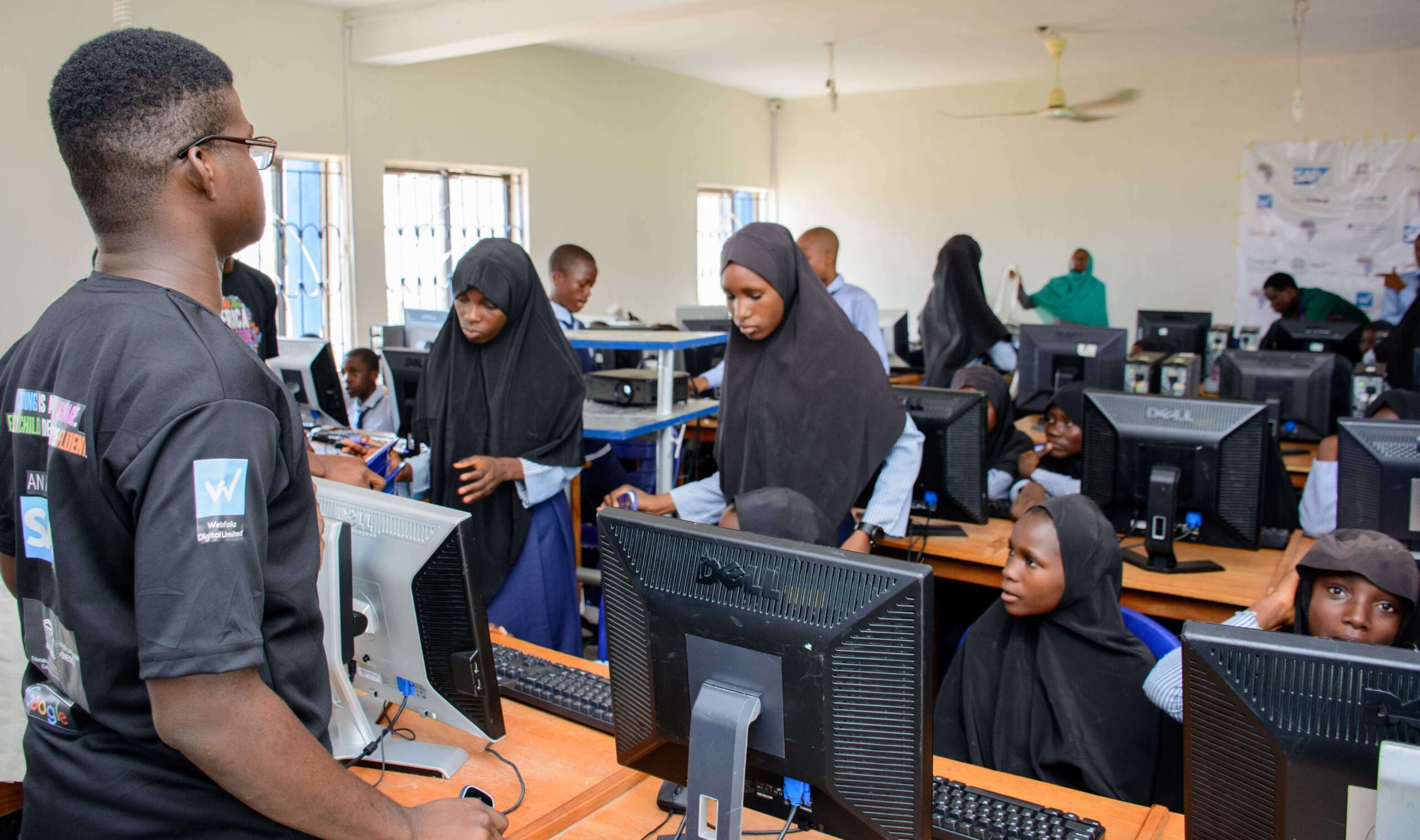Oyeridan Kehinde never imagined she could sell her designs outside her immediate contacts until May 2019.
The 20-year-old tailor lives in Ilorin in Kwara State, but schools at the Adeyemi College of Education in Osun State. She returns home to her family and tailoring business during vacation.
She promotes her clothes on social media, posting pictures and videos to Instagram, Facebook, Twitter, and her Whatsapp status. After seeing the photos or videos, customers and potential ones who like her designs contact her and place orders. And she sends the package to the buyer, irrespective of their city of residence in Nigeria.
This marketing method helps her raise money to support her family and education. Her journey in social media marketing started one hot afternoon in May 2019. She had taken a break from making a customer’s clothes to check her Whatsapp messages. From there, she slid into a friend’s Whatsapp status update inviting young (female) business people to register for free digital marketing training.
“I didn’t hesitate to indicate an interest because as at that time, my business was not getting the visibility I wanted. Only a few friends and family were patronising me, and it wasn’t helping,” Kehinde said.
Kehinde’s friend helped to register her for the training organised by Webfala Digital Skills For All Initiative. This nonprofit gives free general digital education, social media marketing skills, tools, and resources to young (female and youth) entrepreneurs and intending ones across 12 States in Nigeria.
It also promotes science, technology, engineering, and mathematics (STEM) education among girls by visiting secondary schools to talk to female students and encourage them to study STEM-related subjects/courses and build their careers around it.
By the end of the three-day training that was held online, Kehinde had learned how to use social media platforms to promote her designs using her phone.
“At the training, I learned how to promote my brand across social media platforms such as Facebook, Instagram, Twitter and WhatsApp. I also learned how to create business pages and accounts,” she said.
Webfala
Throughout her primary and secondary education, Nafisat Oyediran did not have an opportunity to learn how to use a computer. All her teachers taught was theory and no practice.
After her secondary education, she registered in a computer school to gain computer and digital knowledge. She completed the training in 2010 before proceeding to the University of Ilorin, where she studied linguistics and Nigerian languages.
By 2016, Oyediran had concluded her university programme and was serving as a teacher in a rural community in Osun State as part of her one-year national youth service (compulsory for fresh graduates below age 30).
But most of the children she taught had no access to practical computer knowledge at school because the school had no computers and instructors, and the children had no personal ones because they were mostly from poor homes. She also observed that only a few female students in her class were interested in STEM-related subjects.
She could relate to the student’s situation, reflecting on her primary and secondary school days when practical computer and digital knowledge lessons were unavailable. She then decided to help poor girls pick interest in STEM and gain computer and digital knowledge.
In July 2017, she launched Webfala as a nonprofit (operating from 2 Shalom Street, University Road in Ilorin) to achieve the purpose. Oyediran, who is in her early thirties, developed four programmes of intervention: STEM initiative, Tech4Teach, Digital Skills for Youth, and Boost Your Business (which Kehinde attended).
“We visit primary and secondary schools in underserved communities [one school per time, but at least 10 every year] through the STEM initiative to teach young people – especially girls – to explore the world of STEM and let go of the fears that they might have about pursuing careers in STEM disciplines,” she explained.
According to UNESCO, only 35% of STEM students in higher education globally are women, and men mostly dominate STEM-related careers. The numbers for women shrink lower in developing countries like Nigeria, where cultural, religious and social norms and gender roles sometimes limit the extent to which a girl child can access education or aspire.
For example, a 2020 survey by Tech Cabal (a platform reporting innovation and technology in Africa) shows that the gap in STEM participation between male and female students of the University of Lagos favoured males by more than 300%.
The study showed that while 80.34% of males studied computer engineering, only 19.66% of females studied the same course. In computer science, electrical and electronic engineering and mathematics, it was 82.43% (male) against 17.57% (female), 85.95% (male) against 14.05% (female), and 52.90% (male) against 47.10 (female), respectively.
But Webfala’s visits to schools do not only target to inspire female students to pursue careers in STEM. During such visits, the group also uses engaged facilitators to train school teachers to use digital resources to pass computer and digital knowledge to school kids. This comes under its Tech4Tech initiative, and the training for teachers could last for three days.
“I’m now using what I learnt through the program to teach my students. I teach them about cyber security, how to send emails, and how to check for spam, as well as showing them the beauty of STEM and the employment options accessible to them in the field,” said Abdullahi Olasipo, a 22-year-old teacher at Almansoor Schools in Ibadan. Olasipo was among teachers Webfala trained in 2019.
Young entrepreneurs (like Kehinde) can learn coding and digital skills to sell their businesses and products on social media through Webfala’s “Boost Your Business” and “Digital Skills for Youths” initiatives.
“I have been using the internet and social media for a long time, but I didn’t know there was more to Facebook than the likes and comments,” said Bello Lukman, another beneficiary of Webfala’s digital marketing training. “I now know how to run Facebook Ads, I know about its algorithm, and using websites to promote my business.”
Webfala sometimes works with local authorities and partners like the Kwara State government and SAP Africa – a firm that develops software for business management – to train beneficiaries for free. In July 2021, it partnered with the Kwara State Teaching Service Commission to train 5000 teachers on using digital tools for classroom teaching and learning.
In partnership with the office of the senior special assistant to the Kwara State government on youth empowerment, Webfala is currently training 100 unemployed females in web development and graphics design. The training started last month and will end in March.
“We will train 50 of them in web development while the other 50 will be trained in graphic design,” said Hameed Muritala, Webfala’s head of communication.
Through its initiatives, Webfala has reached about 29,000 young adults and students across 150 schools in 12 states, including Ekiti and Lagos, where it recently expanded to.
Oyediran said Webfala’s work is a contribution to Nigeria’s National Digital Economy Policy introduced by the federal government to transform Nigeria into a digital economy by 2030 by providing digital tools for all.
However, despite having six staff and 20 volunteers, apart from Oyediran, Webfala does not have internal STEM and digital skills instructors in its team. The organisation hires expert instructors anew every time it sets to visit a school for STEM promotion or organise digital skills training.
Muritala said this is because Webfala does not have enough resources to hire and keep expert instructors (who often demand higher pay) in its monthly payroll.
But not having internal instructors brings two disadvantages: it makes it difficult for students to keep in touch with the facilitators to ask questions or get clarifications as the instructors are disengaged immediately after the training. It is also time-consuming, tiring, and sometimes expensive having to source new facilitators every time.
Yet, for Kehinde, attending Webfala’s training was what she needed at the time: “My business has witnessed tremendous growth since I started applying the lessons I learned. I now have more people patronising my brand,” she said.
Meanwhile, there are several other groups working to promote digital literacy and STEM education among girls in Nigeria, including Yellow Rose Launchpad, a nonprofit that provides scholarships to brilliant and poor girls in Nigeria to study STEM-related courses and subjects.
There is also WAAW Foundation. It organises ‘STEM camps’ to introduce STEM to girls and teach them coding, 3D modelling and printing, mobile app development, games creation, animation, and robotics.
Oyeridan Kehinde, a 20-year-old tailor from Ilorin, Nigeria, leveraged social media marketing to expand her business beyond her immediate contacts. This transformation started after attending a free digital marketing training in May 2019, organized by Webfala Digital Skills For All Initiative. This nonprofit provides free digital education and resources to young entrepreneurs and promotes STEM education among girls across 12 Nigerian states.
Webfala, founded by Nafisat Oyediran in 2017, operates various programs including STEM initiative, Tech4Teach, Digital Skills for Youth, and Boost Your Business. The initiative visits underserved schools to encourage girls to pursue STEM careers and train teachers in digital literacy.
Despite its impact, reaching around 29,000 young adults and students and collaborating with partners like the Kwara State government and SAP Africa, Webfala faces challenges. It lacks internal STEM and digital skills instructors due to limited resources, which complicates long-term student-instructor engagement.
The article also mentions other groups promoting digital literacy and STEM education among Nigerian girls, such as Yellow Rose Launchpad and WAAW Foundation.






